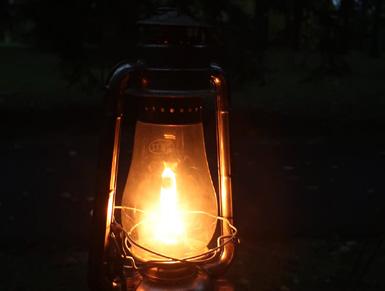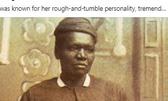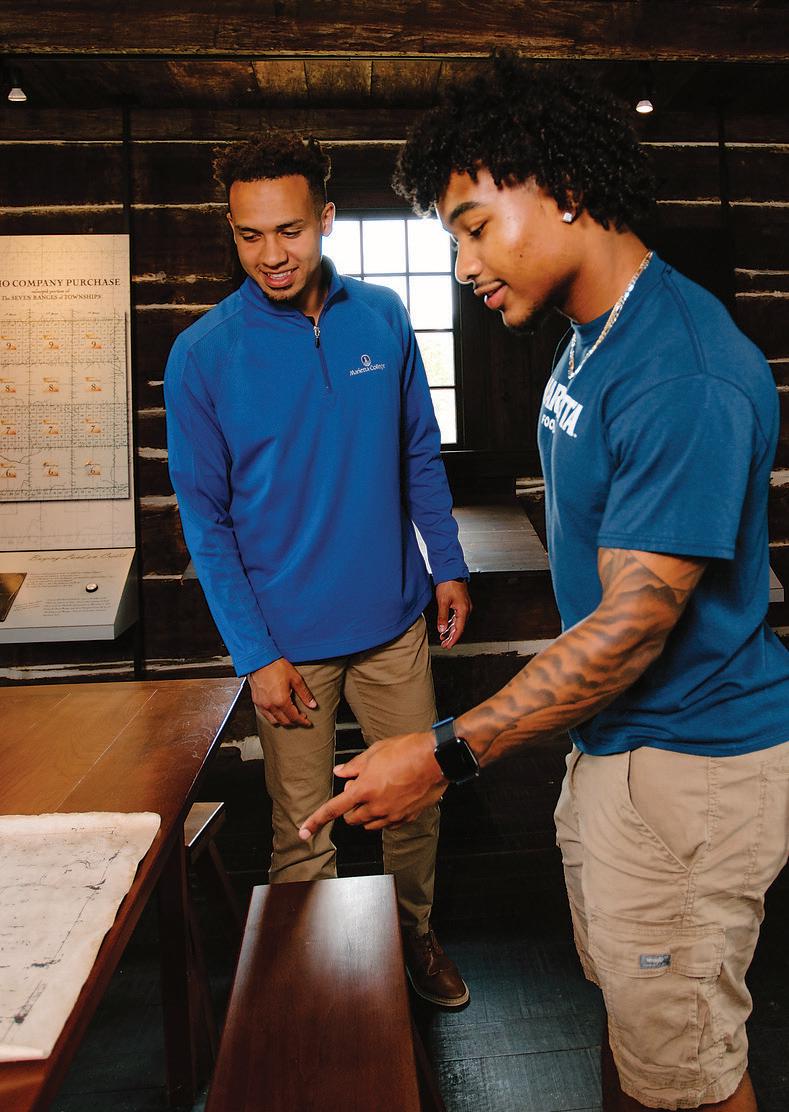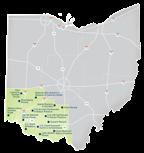TRAVELER’S GUIDE Ohio History Connection
Nation’s AFRICAN AMERICAN HISTORY ON DISPLAY in Wilberforce p. 13
Discover KID-FRIENDLY SITES to Visit p. 19
Sites to VIEW THE FALL COLORS

p. 28
FREE ADMISSION FOR MEMBERS TO 50+ SITES!



Nation’s AFRICAN AMERICAN HISTORY ON DISPLAY in Wilberforce p. 13
Discover KID-FRIENDLY SITES to Visit p. 19
Sites to VIEW THE FALL COLORS

p. 28
FREE ADMISSION FOR MEMBERS TO 50+ SITES!


This third edition includes interesting stories and places that tell the rich history of Ohio. Whether you are 8 or 80, Ohio’s history is your history –and Ohio History Connection sites are the perfect destinations to learn about your home state
I hope that you will use this guide to make new discoveries, plan fun adventures and create lasting memories.
I also would encourage you to explore our state all year long. Hike some of Ohio’s most beautiful nature preserves covered in snow. Learn about state history in the cool air-conditioning of our museums. Watch the leaves change colors in the fall just as ancient American Indians would have thousands of years ago.
History has no season, and neither does travel.
If you’re planning to visit several of our historic sites and museums (and I hope you are!), I recommend purchasing an Ohio History Connection membership. A membership is your personal passport to history, with free regular admission to our 50-plus sites throughout Ohio, as well as other benefits and discounts.
If you are visiting a site, attending an event or becoming a member, thank you. Your support helps us preserve and share Ohio’s stories with future generations.
Now it’s time to get out there and explore. Safe travels!
Megan Wood, Executive Director & CEO Become a member!


Bask
By Damaine Vonadain the beauty and tranquility of a unique environment that has remained virtually undisturbed for 10,000 years.
If nature preserves got grades, Cedar Bog would merit an A+. The wetland became Ohio’s first designated nature preserve back in 1942, and today, it’s one of America’s prehistoric treasures and a National Natural Landmark. Although Cedar Bog covers only 450 acres, it’s regarded as Ohio’s largest and best boreal and fen complex and boasts the greatest plant diversity of any place in the state, harboring an amazing 40 percent of the rare and endangered plant species in Ohio.
“Cedar Bog is considered by some to be the crown jewel of Ohio’s natural areas,” says Site Manager Mike Crackel, “and that’s high praise because this state has so many incredible preserves and natural areas.”
Poised between two glacial moraines in Northwest Ohio’s Mad River Valley, Cedar Bog is a relic of the Ice Age when glaciers advanced and retreated in successive waves over present-day Ohio. The massive ice sheets flattened much of the landscape, ground boulders into stones and pushed boreal plants out of northerly latitudes.
“Northern white cedar is our namesake because the trees grew here from seeds deposited by the glaciers,” says Crackel.
Cedar Bog offers a glimpse into what the landscape looked like during the waning Ice Age when it was home to mastodons, giant ground sloths and beavers the size of bears. Learn more about why northern white cedars flourish here inside the Education Center.
The glaciers also buried the ancient and mighty Teays River and filled it with sand and limestone gravel that hold enormous amounts of water. The cool, alkaline groundwater continually rises to the surface, creating a microclimate favorable to the cedars and other Ice Age transplants — including thirsty sedges, dwarf birch and showy lady’s slipper orchids — in Cedar Bog.
“The water is our lifeblood,” notes Crackel. “Without that deep, underground aquifer, Cedar Bog would not exist."
Cedar Bog is considered by some to be the crown jewel of Ohio’s natural areas...
At the Education Center, you’ll also learn that Cedar Bog isn’t a bog. It’s actually a fen that was misnamed decades ago. Bogs and fens both contain water, so what’s the difference? Since their distinctions involve geology, hydrology and even botany, the Education Center supplies a catchy phrase to help you understand: bogs clog and fens flush. In a bog, water accumulates, but in a fen, water simply flows through.
Cedar Bog’s boardwalk trail is open daily from 10 a.m. to 4 p.m.. Flat, straight and ADA accessible, the boardwalk loops through Cedar Bog for 1.2 miles, and takes you through habitats that include a rare sedge meadow, a thick cedar swamp and a hardwood swamp where towering tulip trees reach for the sky.
“I tell people to slow down and take their time on the boardwalk,” Crackel says. “They should look up, down and around and use all their senses except touch, because everything here is protected under state law.”
While you can’t pick flowers or catch butterflies at Cedar Bog, you certainly can hear the gobble of a wild turkey, the flute-like call of a wood thrush, the trills of grey treefrogs looking for a mate and the surprisingly loud chirps of thumbnail-sized spring peeper frogs. Keep a sharp eye out for carnivorous plants like roundleaf sundew, a tiny boreal carnivorous plant that traps insects on its sticky leaves. You might even spot an endangered elfin skimmer dragonfly darting among the sedges. Only three-fourths of an inch long, it’s the smallest dragonfly in North America but quite colorful, for males are steel blue and females sport yellow and black striped tails.
One creature you’ll have no trouble seeing is the five-lined skink, a shortlegged lizard that loves to scurry across the boardwalk all summer long. “They’re very quick but will stop running and wait long enough for you to take a picture,” says Crackel.

In addition to its northern plants, climate changes — including a period of global warming that occurred a few thousand years ago — introduced prairie and Atlantic coastal vegetation into Cedar Bog. “Those three types of plants now thrive side by side in this environment,” says Crackel. “That’s very unusual and one of the great things about Cedar Bog.”
For visitors, the beautiful result of that extraordinary plant population is Cedar Bog’s incomparably varied, constantly changing array of wildflowers. Go there in late January or February and you’ll see deer tracks on the boardwalk as well as Ohio’s earliest blooming wildflower, the skunk cabbage, poking its head through the snow. In the spring, yellow marsh marigolds blanket the swamp forest, while Ohio’s state wildflower, large-flowered trillium, brandishes white blossoms that gradually turn pink. When June arrives, nature lovers come from far and wide for the spectacle of tall, magenta and white showy lady slippers blooming at the same time as much shorter but equally vivid grass pink orchids. During the popular Orchid Walk, you’ll find naturalists stationed along the boardwalk ready to answer questions.
Cedar Bog’s summertime show continues as prairie dock shoots up high, bare stalks crowned by yellow flowerheads, and queen-of-theprairie lives up to its royal name with

magnificent plumes of flowers that resemble pink cotton candy. Then as tree leaves change to russet and the sedges turn brown, goldenrod and sky-blue lesser fringed gentians stunningly punctuate the preserve’s autumn palette. Cedar Bog’s yearlong parade of colors demonstrates the enduring appeal of a singularly splendid place that represents a vanished world yet remains fresh, dynamic and alive.
“You can come here every day and see something new each time,” Crackel says.
CEDAR BOG
980 Woodburn Rd. (Off U.S. 68)
Urbana 43078
800.860.0147
ohiohistory.org/cedarbog
• Arrive in Sandusky
• History and Halloween tour of Sandusky with Firelands Adventure Tours

• Lunch and free time downtown
• Dinner at Gideon Owen Wine Company
• “Spirit Stories at Spiegel Grove” at Rutherford B. Hayes Presidential Library & Museums* in Fremont
• Overnight in Fremont
• Depart for Port Clinton
• Candle-making demonstration at Northern Exposure Candle Company
• Tour and tasting at Great Lakes Popcorn Company

• Free time in Port Clinton
• Depart for Toledo
• Tour and tasting at Maumee Bay Brewing Company
• Dinner at Tony Packo’s Café
• Garrison Ghost Walk Tour at Fort Meigs* in Perrysburg
• Return to Sandusky for overnight at Sawmill Creek Hotel in Huron
*Ohio History Connection site
Sandusky was an important Underground Railroad site and Harriet Beecher Stowe wove Sandusky into her book Uncle Tom’s Cabin (1852).

LIKE THIS ITINERARY? FIND MORE AT

Whether you’re looking for a quick getaway or wanting to get more stamps in your sites passport, there are plenty of Ohio History Connection sites to explore. Some are close enough to one another that you can reach several all in one day.


With eight presidents from Ohio, it’s no wonder our state is called the “Mother of Presidents.” Explore the childhood of one of our famous presidents, Ulysses S. Grant. Located about half an hour southeast of Cincinnati, the U.S. GRANT BIRTHPLACE in Point Pleasant, Ohio, is the three-room house where the future president was born, and features Grant family artifacts. The growing family paid $2 a month in rent, then before Grant’s first birthday, moved to nearby Georgetown, Ohio. At the U.S. GRANT BOYHOOD HOME & SCHOOLHOUSE in Georgetown, the story of President Grant’s childhood continues. Explore young Ulysses S .Grant’s life by visiting the school he attended and his boyhood home, restored to its appearance in 1839, the year Grant left for West Point. Grant lived in this home longer than any other house during his lifetime. Only 30 minutes from the birthplace, it’s an easy day trip to visit both.
Looking for indigenous and natural history? Look no further than NEWARK EARTHWORKS . Just under 40 minutes east of Columbus, it’s the largest set of geometric earthen enclosures in the world. In a museum at the Great Circle (check ohiohistory. org/newark for museum hours), learn about the American Indians who built these earthworks more than 1,500 years ago to perfectly align with risings and settings of the moon. Newark Earthworks is one of seven sites associated with Ohio’s ancient Hopewell people, collectively known as the Hopewell Ceremonial Earthworks, that are proposed to become Ohio’s first World Heritage
site, a United Nations designation recognizing sites of outstanding international importance. Just 15 miles east of Newark Earthworks is FLINT RIDGE ANCIENT QUARRIES & NATURE PRESERVE , also rooted in indigenous history. See pits left in the wooded landscape by ancient American Indians who came to quarry flint there. With over three miles of hiking trails, it’s the perfect chance to stop and stretch your legs as you learn about Ohio’s official gemstone.
Don’t want to sit in the car all day?
Head to Tuscarawas County in northeast Ohio, where you can visit three sites in one day. We recommend starting at FORT LAURENS , the site where Ohio’s only Revolutionary War fort once stood. An on-site museum shares the stories of the soldiers on the frontier. Then take a short 10-minute drive to ZOAR VILLAGE . This one-of-a-kind village was home to a communal society of German religious dissenters from 1819 to 1898. Walk around the well-preserved town, a National Historic Landmark district, and enjoy a stroll through the big public garden.


For the last stop, explore a different kind of village, SCHOENBRUNN VILLAGE . Located in New Philadelphia, just 20 minutes from Zoar, this site is the location of several of Ohio’s firsts—church, schoolhouse and code of laws. Schoenbrunn was founded in 1772 as a Moravian Christian mission among the Delaware Indians. The village consists of a visitor center and 17 reconstructed log structures as well as the church and gardens.
Ohio History Connection members enjoy free regular admission to all of these sites. Visit ohiohistory.org/join.
As you plan your next road trip, be sure to visit ohiohistory.org/sites for hours and locations. We always recommend that you call ahead to confirm hours and other details before you head out.

 By Rich Warren
By Rich Warren
Pay a visit to the National AfroAmerican Museum and Cultural Center (NAAMCC) in Wilberforce today or over the next few months. You'll see astonishing items that reflect the rich history of Black America. Just some of the highlights: a program from the 1963 March on Washington at the Lincoln Memorial, a suit Count Basie wore on stage, manumission papers proving their holder's freedom, a colorful collection of black dolls and many more objects that illustrate the stories of Black Ohioans.

Come back in six months to a year, and you will see a brand new array of exhibits created from the vast holdings of the NAAMCC. The museum's collections include 9,000 artifacts, nearly 700 linear feet of documents and tens of thousands of historical photographs. Among those holdings are Alex Haley's typewriter and notes from his travels to Africa, Gregory Hines' tap shoes and a buffalo hide coat worn by a Buffalo Soldier. The everchanging array of exhibits at the NAAMCC benefit from the vast number of materials in its collections.
The museum opened its doors in 1988 after years of discussion in the Ohio legislature about opening a national educational institution focusing on African American history. Wilberforce was chosen as the site since the town was a significant stop on the Underground Railroad and is the home of Wilberforce University, the first Black-owned and operated institution of higher learning in the country. Opened in 1858 by the African Methodist Church, Wilberforce University educated future leaders who brought a wealth of activism and culture to the nation.
The mission of the museum and cultural center, housed in a Modernist structure of glass and steel adjacent to Central State University, is to chronicle the rich experience of African Americans from their arrival in 1619 to the present day. The NAAMCC is a part of the array of statewide historical attractions under the auspices of the Ohio History Connection (OHC). The NAAMCC has welcomed thousands of visitors over the years. The museum has also hosted many dignitaries, such as former President George H.W. Bush, Muhammed Ali and Wynton Marsalis.
When the Smithsonian Institution opened its National Museum of African American History and Culture in Washington, D.C., in 2016, the NAAMCC pivoted, choosing to work alongside the new facility in the nation's capital to complement its mission. "We're now more focused on how Ohio feeds into the national narrative of African American history," says Dr. Charles Wash, director of the NAAMCC. "But since we started our collection long before anyone else, we have things here that the rest of the museum world is envious of. It's our job to let the public know what they can find here and nowhere else."
NAAMCC's 10,000 square feet of exhibit space can only display a small fraction of the institution's overall collection at any one time. But that doesn't mean the public doesn't have access to other
We're now more focused on how Ohio feeds into the national narrative of African American history...
materials. Additional artifacts, documents and photos can be viewed by anyone who makes an advance appointment specifying what they want to see. And because of an ongoing program of digitizing its materials, a treasure trove of images can be viewed in the comfort of the researcher's home by searching on the Ohio History Connection's website, ohiomemory.org
Three exhibits on display through the remainder of 2023 include "Queens of the Heartland," which tells the stories of 30 Ohio women influential in the Suffrage and Civil Rights movements. The Queens exhibit features forgotten "she-roes" like Frances Ellen Watkins Harper, who established the National Association of Colored Women, to prominent, well-known figures like Toni Morrison, Nikki Giovanni and Ruby Dee. The exhibit "Rhythm of Revolution: The Transformative Power of Black Art, 1619 to the Present" looks at the convergence of the arts, religion and the Civil Rights Movement from 1619 until now. The fascinating exhibit "African Americans Fighting for a Double Victory" looks at Black involvement in America's conflicts from the American Revolution to the present day, with a particular emphasis on World War II. It also tells the story of the Tuskegee Airmen, and how Black veterans played a role in the Civil Rights movement. A series of paintings show African Americans training for the military alongside patriotic posters of the era.
“Sharing our collections is an important part of our mission,” Dr. Wash explains. “What good is a museum if it hoards its materials and doesn’t provide access to the general public?”

Exhibits ending in February include the "Art of Soul," a juried exhibition of artwork on the theme of "Black Love," as well as "Behind the Mask: Black Power in the Comics," which tells the history of Black comic book characters, including such icons as the Black Panther, who surprisingly made his debut as long ago as 1966. The comic exhibition will return in an expanded format in 2024.
Coming later in 2023 are two new exhibitions: "African Art: Form, Function, and Fraught Histories," which opens in April, and "Prophets of a Dream: The AME Church and the Fight for Freedom," making its debut in October.
Items from the NAAMCC's collections also travel the world. A piece called "Freedom Now!" by Black artist Reginald Gammon is currently on display at the New York Jewish Museum through March. Past exhibits featuring loaned materials have
traveled not only to the Smithsonian but also to the Tate Museum in London and the Musée du Quai Branly in Paris. The NAAMCC staff recently completed "Paul Laurence Dunbar: Diamond of the Gem City." The exhibit highlights the multifaceted writer's life, work and legacy through text panels, archival materials and three-dimensional objects. The NAAMCC created the exhibit in collaboration with National Park Service's Dayton Aviation Heritage National Historical Park.
The museum also offers a wide variety of programming at its Wilberforce location and around the state, including programs on both Martin Luther King Day and Juneteenth in collaboration with Ohio History Connection. For more information on the NAAMCC exhibits, events and hours, go to ohiohistory.org/naamcc.



There comes a point where you just need to get the kids out of the house. Whether it’s on spring break or summer vacation, it’s easy to forget what you learned in school, especially when it comes to memorizing dates and facts. At Ohio History Connection sites, history comes alive for children of all ages. Whether you're six or six at heart, there are plenty of places to visit that'll see your children having so much fun, they won't even realize they're learning!

When it comes to battlegrounds, northwest Ohio’s Fort Meigs should be on every family’s list. Fort Meigs tells the story of the War of 1812 at one of America’s largest reconstructed log forts. With blockhouses, artillery batteries, a quartermaster’s building and traverses that troops used to defend the fort from British cannon fire, there’s plenty of space for your little ones to explore. The blockhouses have fun interactives, including recreated 1812 tents, examples of how to march like a soldier and more. The fort is open from April through October. In the museum and visitor center, open year ‘round, you’ll find exhibits sharing the story of Ohio at the time of the war. Coveted by the British and U.S. governments, Ohio was just nine years old as a state and still the frontier at the start of the War of 1812, and still home to many American Indians whose ancestors had lived and hunted on these lands for thousands of years.

The National Afro-American Museum & Cultural Center in Wilberforce, Ohio, displays Ohio and U.S. history through the lens of the African American experience. Curators draw on Ohio Education Standards in their content and have a few tricks up their sleeves to make exhibits engaging to kids. For example, the design of Queens of the Heartland, an exhibit featuring stories of 30 Black Ohio women who were influential in the suffrage and civil rights movements, is inspired by social media. The panels look like Instagram selfies, with each movement represented by a custom emoji and quotes designed as tweets. In the exhibit African Americans Fighting for a Double Victory, highlighting those who served our country during World War II, younger kids can dress up in the uniforms of different wartime occupations, learn about rationing and take selfies with protest signs. The exhibit What’s In Your Attic? has a kids’ track low to the floor, where grade-schoolers can learn a bit of the Shawnee and Myaamia languages, play a “Where’s Waldo”-style game and read questions aimed at their age group. The National Afro-American Museum & Cultural Center is on Central State University’s campus in Wilberforce, Ohio, about 30 minutes from Springfield and Dayton. The museum is open Wednesday through Saturday 9 a.m.–4 p.m., though we always recommend calling ahead to confirm hours for the day you plan to travel.

At I-71 & 17th Avenue (Exit 111) in Columbus, the Ohio History Center is the state’s history museum. With exhibits ranging from natural history to Civil War battle flags, it’s a great place to get the kids excited about history. The Nature of Ohio exhibit includes a play area for little ones to explore and read about natural history. The exhibit 1950s Building the American Dream allows you to immerse yourself in the 1950s in a real, fully furnished Lustron ranch-style house made of porcelainenameled steel. If you have littles who like to play house, this is the perfect exhibit for them. The museum is open year ‘round, Wednesday–Sunday 10 a.m.–5 p.m., and offers snacks and quick bites at the second-level Plaza Cafe. In summer, your Ohio History Center museum tickets also include admission to Ohio Village, a recreated village of the 1890s located next door to the Ohio History Center. With over a dozen buildings to explore and a playground on site, there’s little time for standing still. Ohio Village is open seasonally, with themed events occurring in October and December. Be sure to check hours before planning your visit.


• Visit the world-renowned Butler Institute of American Art, the country’s first museum dedicated to works created solely by American artists.
• Stop at The Amish Market, Ohio’s first indoor Amish market with over 30 vendors selling products.
• Lunch at Das Dutch Haus, restaurant featuring Pennsylvania Dutch-style home cooking.
• Visit White House Fruit Farm and try their famous blueberry donuts!
• End your day at Mastropietro Winery doing wine tastings in a beautiful Tuscan style tasting room
• Tour the historic Lanterman’s Mill, a still operating 1846 gristmill.
• Stroll through Fellows Riverside Gardens, a 12-acre public display garden

• Lunch at the Garden Café by Kravitz
• Visit the Youngstown Historical Center of Industry & Labor* for a unique look into the steel industry and how it shaped the Mahoning Valley
• Stop by Handel’s Ice Cream for a treat on the way home, a Youngstown tradition!
Visiting the Youngstown Historical Center of Industry & Labor? Make it a weekend trip and explore the best of Mahoning Valley! *Ohio History Connection site



Ohio is about to make history. Eight earthwork sites in southern and central Ohio, collectively called the Hopewell Ceremonial Earthworks, may very soon join the likes of Machu Picchu, the Taj Mahal, Stonehenge and the Grand Canyon on the UNESCO World Heritage List.


World Heritage is the highest honor that a cultural or natural site can receive, and this extraordinary designation for the earthworks would be the United States’ 25th and Ohio’s first World Heritage site.
The Hopewell Ceremonial Earthworks include the Octagon Earthworks and Great Circle Earthworks in Licking County, Fort Ancient Earthworks in Warren County and five sites that make up the Hopewell Culture National Historical Park in Ross County. For over a decade, the Ohio History Connection and the National Park Service have worked with Tribal nations and stakeholders across the state and the country to achieve this historic honor. In September, the UNESCO World Heritage Committee will consider and vote on our nomination for inscription.
“When we talk about World Heritage, we’re talking about sites with outstanding value to all of humanity,” says Jen Aultman, Chief Historic Sites Officer at the Ohio History Connection. “These places should matter to all people, no matter what flag you live under. We all have something to gain by ensuring these places are preserved.”
The Hopewell Ceremonial Earthworks were created 2,000 years ago by the ancestors of American Indians and are the largest concentration of geometric and monumental earthen architecture in the world today.
Over just a few generations, the earthwork builders gathered, organized and worked together to plan and build monumental public works on an astonishing scale, with precise geometric shapes and alignments. Using precious materials brought from distant places, they created ceremonial artifacts of exquisite beauty and deposited them in the mounds.
Their achievements made them a dominant cultural influence across much of North America. Getting these sites
inscribed on the UNESCO World Heritage list will give the achievements of Ohio’s Indigenous people the recognition they deserve and raise the profile of Ohio to the world stage.
It will also strengthen Ohio’s tourism industry and support the communities around the sites. In fact, an economic impact study prepared by Ohio University estimates that visitation to these sites will double. We also expect to see an increase in the number of overnight travelers who will stay in bed and breakfasts, visit nearby attractions and eat at local restaurants.
This decade-long nomination project has been entirely funded by generous contributions from individuals, foundations, organizations and local governments. $1.5M has been raised to date, but Inscription is only the beginning, and more support will be needed to prepare for the future of the Hopewell Ceremonial Earthworks as World Heritage sites. Ohio History Connection and our partners are working to increase Tribal voices at the sites, planning for Tribal interpreters, guided tours and other interpretive elements like exhibits and programming. People will be able to come and experience the moonrise at the Octagon Earthworks and the summer and winter solstice sunrises at Fort Ancient.
“We envision a future where people from all over will come to learn about the sites and experience them firsthand,” says Aultman. “People will step out of their daily lives and think about what it meant to be human then and what it means today.”
To support this essential work and ensure the Hopewell Ceremonial Earthworks’ permanent preservation, visit ohiohistory.org/worldheritage.
Questions? We’d love to hear from you! Call 800.647.6821 or email donations@ohiohistory.org.

SEE MAP ON PAGES 26-27
The Underground Railroad was a network of people, secret routes and safe houses established in the United States during the early-to-mid 19th century and used by enslaved African Americans to escape into free states and Canada with the aid of abolitionists and allies who were sympathetic to their cause. Citizens of Clermont County, Ohio were major contributors to the Underground Railroad movement.

For more information about the Freedom
visit discoverclermont.com
*Ohio History Connection site

People from all across the Midwest will flock to Ohio as days get shorter and nights get longer to view the changing leaves. While many think of state parks, we’ve listed a couple of alternatives to get out and not only capture the changing colors, but avoid some of the crowds and learn a little along the way.
With more than 3 miles of trails and a scenic overlook, FORT ANCIENT EARTHWORKS & NATURE

PRESERVE near Oregonia and Lebanon is a perfect place to stop and take in the variety of fall colors. During the peak season, the site will have bursts of reds, oranges and yellows as leaves change. In addition to its natural features, at Fort Ancient you can see expansive hilltop earthworks that ancient American

Indians built about 2,000 years ago. With a museum sharing the story of the earthworks and the ancient people who built them, you can easily spend several hours enjoying all this site has to offer. Fort Ancient is one of seven ancient sites in Ohio collectively called the Hopewell Ceremonial Earthworks proposed for addition to the UNESCO World Heritage List, which recognizes places worldwide of outstanding universal value to humanity.
Ripley, Ohio, is right on the Ohio River, an hour east of Cincinnati. Considering its location, it’s not a surprise that the village of Ripley, little-changed since before the Civil War, was a major stop on the Underground Railroad. Ripley’s JOHN RANKIN HOUSE was one of Ohio’s most active Underground Railroad “stations“ and remains one of the best documented. It overlooks the Ohio River from a bluff high above the town and provides gorgeous panoramic views that stand out in the fall. The town of Ripley has a 55-acre historic district listed in the National Register of Historic Places. Walk Front Street and take in the sights and sounds of river life, including the historic riverside homes—among them the restored home of Black Underground Railroad “conductor” John P. Parker, now a museum—and try one of the great local restaurants.
Located in southwestern Ohio, DAVIS MEMORIAL NATURE PRESERVE is an 88-acre preserve with more than two miles of hiking trails. It includes large parts of the Buckeye Trail, a 1,440-mile hiking trail circling the state of Ohio. Within the preserve is a boardwalk leading to 30-foot cliffs of exposed bedrock that are over 400 million years old. The easy hikes and gorgeous colors allow visitors to take in the natural beauty of Ohio. Davis Memorial Nature Preserve is an hour south of Chillicothe and free to the public.

A hidden gem of Ohio history and natural beauty, BUCKEYE FURNACE , near Wellston, is a 270-acre site with a restored iron-making furnace built in 1852. Furnaces like this one, once scattered throughout rural southeast Ohio, produced iron that helped win the Civil War. The site has five reconstructed buildings associated with the historic iron-making furnace and several nature trails that you can take to explore the area around it. Buckeye Furnace is a good alternative to some of the state’s larger parks that get crowded with visitors during the peak of fall color.
There are so many more Ohio History Connection sites to explore where you can enjoy the changing colors. We always recommend checking ohiohistory.org/sites for days and hours before traveling to ensure the best experience.
When it comes to timing your fall adventure just right, we recommend scanning the QR code below to visit the Ohio Department of Natural Resources Fall Color Report to see what areas in Ohio are in peak season and which are just starting to change.

Want to discover little-known local stories or weird fun facts?
Looking to see what events are happening? Just want see what we’re up to?
Have you heard that after 54 years of operation in Columbus, Eastland Mall has closed its doors?

Mary Fields, AKA Stagecoach Mary, was the first African American woman to carry mail for the USPS.

In the 1950s, Emma "Grandma" Gatewood, mother of 11, decided she would be the first woman to solo thru-hike the #Appalachian Trail


At the confluence of the Ohio and Muskingum Rivers in Southeast Ohio, the city of Marietta played a starring role in the northwestern expansion of the United States.
By Laura PytlikThis historic river town is home to the Campus Martius Museum, where the story of General Rufus Putnam and his intrepid group of pioneers is chronicled through fascinating exhibits and artifacts.
As you enter the grounds of the Campus Martius Museum, you’re stepping back in time to 1788, when our country was still an infant and this land was contested among several American Indian Nations, the Americans and the British. When Putnam and other Revolutionary War officers of the Ohio Company arrived at the verdant lands along the riverbanks, they constructed a civilian stockade as protection during the Northwest Indian Wars, making Marietta the first permanent civilian settlement of the Northwest Territory.
After the 1795 Treaty of Greenville ended the war and limited Indian Territory to northwest Ohio, the stockade was dismantled. Marietta continued to grow and thrive as an important gateway to the north and west. Today, the museum remembers the legacy of the American pioneers and history of the land. In the museum, tools and other objects made by American Indians over thousands of years paint a picture of the region’s diverse and enduring Native peoples. History unfolds through exhibits about The Ordinance of 1781 and the Ohio Company. Readers of David McCullough’s book The Pioneers will recognize the family names featured in his best-selling narrative. The Pulitzer Prize winning author conducted extensive research in the Marietta College Legacy Library’s Special Collections, studying original journals and documents to accurately portray the ordeals and triumphs of those first pioneers.
Grasp how history unfolds as the museum continues to tell the story of Marietta through the 20th century. You’ll see how the townspeople made their living through crafting rifles, building furniture and even producing oil. Further exhibits take you into the industrial age and beyond, capturing Ohio’s rapid growth and expansion.
Get an intimate look into pioneer life inside the Rufus Putnam House, still standing on its original location, now sheltered by the museum walls. The house’s wooden sides still bear visible scars of the axe and tools used so long ago, when the lush forest provided ample lumber for the new settlement.

Inside the house, interpretive guides help you imagine daily life. Learn how Mrs. Putnam cooked wild game over an open fire. Take a peek in the nook where General Putnam kept his private papers and the bedchamber the family shared. Although the pioneers’ lifestyle may have been modest, it was also comfortable, and the vignettes include gracefully curved chairs and well-crafted fixtures.
Outside the walls of Campus Martius, you’ll find another crucial landmark. The Ohio Company Land Office survives as the oldest standing building in Ohio. The simple wood structure may be small, but its role was vital to the settlement of the Northwest Territory.
Inside the humble office, you’ll find yourselves surrounded by the memories of hopeful settlers preparing to stake their claims. Historic maps line the walls transporting you back to a different time. You can just picture the pioneers huddled around the long wooden tables recording land transactions and marking maps.
Get up close to a majestic, steam powered stern-wheel towboat, the W.P. Snyder Jr. Built in 1918, this beauty was the last steamboat to glide through Lock No. 1 on the Muskingum River.


It remains docked as the last intact boat of its kind and provides an interactive lesson about river transportation and the daily routines of the riverboat captains.
Standing aboard the ship, you can imagine the bygone sounds of a river bustling with traffic, whistles and steam engines mixed with the shouts of crews and dock hands.
The pioneer and riverboat eras may be in the past, but the historic city of Marietta remains as a vibrant river town proud of its role in the settling of the Northwest Territory. After spending a day or a weekend exploring Campus Martius Museum and other local attractions you’ll leave with a deepened appreciation of this beautiful river’s importance in American history.
• Arrive in Marietta
• Cruise on the Valley Gem Sternwheeler
• Demonstration at Justajar Design Press
• Lunch at The Levee House
• Tour of the Campus Martius Museum*
• Evening entertainment at Peoples Bank Theatre
• Overnight at Lafayette Hotel
• Depart for Cumberland
• Wildlife safari at The Wilds
• Make-and-take bath salts experience at An Enchanted Garden
• Depart for Cambridge
• Lunch at Theo’s Restaurant
• Tour of the National Museum for Cambridge Glass
• Dinner at Salt Fork Lodge
• Overnight in Cambridge
FUN FACT!
There is only one Coshocton in the world.
• Depart for New Concord
• Tour of the John and Annie Glenn Museum*

• Depart for Zanesville
• Lunch at Bryan Place
• Demonstration at Alan Cottrill Sculpture Studio
• Hands-on project with local artist

Susan Nash
• Dinner at The Old Market House Inn
• Evening entertainment at Renner Theatre
LIKE THIS ITINERARY? FIND MORE AT
+ OUR PICKS FOR A COFFEE OR HOT CHOCOLATE STOP FOR AFTER YOUR VISIT!
By Truda Shinker, Ohio History Connection Membership ManagerCold weather hikes are a great way to shake the winter blues. Get bundled up and head out to one of these Ohio History Connection sites this winter to get out of the house, get some exercise and get a new perspective on our state’s incredible natural history. Then grab a coffee or hot chocolate to warm up before you head home!
We always advise that you call the site and coffee houses directly to verify opening days and hours before you head out on your road trip.
Experience Ohio as it was over 10,000 years ago as you walk along a mile-long boardwalk through this 450-acre preserve in Urbana. Look for skunk cabbage in February (it blooms because it can thaw the ice and snow around it). A National Natural Landmark, Cedar Bog Nature Preserve is the largest and best example of a boreal and prairie fen complex in Ohio. Cedar Bog is home to 40% of Ohio’s rare species, in one location.
Cedar Bog offers a glimpse into what the landscape looked like during the waning Ice Age when it was home to mastodons, giant ground sloths and beavers the size of bears.
The nature center is closed during the winter, but the boardwalk is open daily from 10 a.m.-4 p.m.. Be sure to check hours in advance as the entire site is closed on certain dates throughout the winter for deer hunting season. For more information, check out ohiohistory.org/cedarbog. You can also call the site directly at 937.484.3744.
Grab a hot chocolate or coffee at The Depot Coffeehouse in Urbana!

FLINT RIDGE ANCIENT QUARRIES & NATURE PRESERVE + RIVER ROAD COFFEEHOUSE ON THE SQUARE
Hike trails through the 533-acre preserve and see ancient pits left by American Indians who came from the surrounding area to quarry flint. The unique rainbowcolored flint was used as an item of trade, tools and weapons.

Flint Ridge in Glenford is a nearly eightmile-long vein of high-quality flint located in Licking and Muskingum counties of eastern Ohio. Hundreds of quarry pits and workshop sites are scattered across more than 2,000 acres of ridge top in these Appalachian foothills. It has been called the “Great Indian Quarry of Ohio."
The museum is closed during the winter, but the trails are open year round. For more information, visit ohiohistory.org/flintridge.

Enjoy a warm treat at the River Road Coffeehouse on the Square in Newark!
FORT HILL EARTHWORKS & NATURE PRESERVE + THE DAILY GRIND
Fort Hill in Hillsboro has what many call the best hiking trails in the state, encompassing 1,300 acres in Highland County. You can hike to a stone and earthen-walled Hopewell hilltop enclosure at the top of Fort Hill. With a circumference of 1.5 miles, the earthwork has 33 gateways and, on the inside, a large ditch. Fort Hill’s hilltop earthworks are accessible only by hiking to the top. Two trails terminate at the enclosure.
The Fort Hill Education Center is open by appointment only, but the trails are open all daylight hours Monday-Sunday except for specific dates during deerhunting season in November and January each year. Please call the site manager at 800.283.8905 for more information. For general information about the site, visit ohiohistory.org/forthill.
Treat yourself to a hot drink at The Daily Grind in Hillsboro!

Perched on a ridge just outside the village of Leo, Leo Petroglyph & Nature Preserve is a legacy of the American Indian peoples of ancient Ohio. Protected beneath the roof of a shelter house, a large flat sandstone slab preserves the traces of some of the most remarkable rock art in Ohio. The panel of petroglyphs includes between 37 figurative drawings ancient people cut into the sandstone outcrop. The exact age of the carvings is unknown, but based on the degree of weathering of the soft sandstone, the carvings are probably not more than 1,000 years old. The art is likely the work of the Fort Ancient culture.
A half-mile trail leads through a gorge and along unglaciated Mississippian sandstone cliffs that are 20–65 feet high. The trail follows a small intermittent tributary of Sour Run that runs through the gorge, before eventually draining into Little Salt Creek and then into the Scioto River near Richmond Dale.
The trails at Leo Petroglyphs are open during daylight hours Monday-Sunday. For more information, visit ohiohistory.org/leopetroglphs.
Take a break before you head home at The Spot on Main in Jackson!
TO READ MORE STORIES LIKE THIS, visit ohiohistory.org/blog


***Closed


